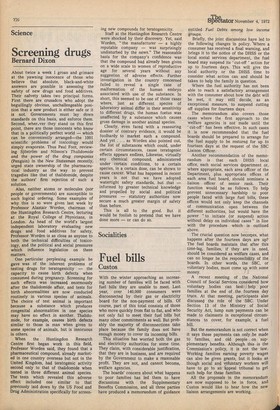Socialities
Fuel bills custos
With the winter approaching an increasing number of families will be faced with fuel bills they are unable to meet. Last year, over 140,000 consumers were disconnected by their gas or electricity board for the non-payment of bills. Of course, part of this total consists of those who move quickly from flat to flat, and who not only fail to meet their fuel bills but many other commitments as well. But probably the majority of disconnections take place because the family does not have enough money to cover its incoming bills.
This situation has worried both the gas and electricity authorities for some time. They claim, with considerable justification, that they are in business, and are required by the Government to make a reasonable profit. They are not, and cannot become, welfare agencies.
The boards' concern about what happens to poor families has led them to have discussions with the Supplementary Benefits Commission, and all three parties have produced a memorandum of guidance entitled Fuel Debts among low income groups.
Briefly, the joint discussions have led to the following changes in policy. Where a consumer has received a final warning, and brings it to the notice of the DHSS or the local social services department, the fuel board may suspend its 'cut-off ' action for up to fourteen days. This will give the local authority or the DHSS time to consider what action can and should be taken to help the family in question.
Where the fuel authority has not been able to reach a satisfactory arrangement with the consumer about how the debt will be met, it may still decide, as an exceptional measure, to suspend cutting off supplies for fourteen days.
The memorandum also covers those cases where the first approach to the welfare agencies is not made until the ' cut-off ' has been effective. In such cases it is now recommended that the fuel boards should be prepared to arrange for the fuel supply to be restored for up to fourteen days at the request of the SBC Liaison Officer.
Another recommendation of the memorandum is that each DHSS local office, each social services department or, where appropriate, each area officer of the Department, plus appropriate offices of each area fuel board, should nominate a liaison officer of senior rank. Their function would be as follows. To help prevent unnecessary hardship to poor people faced with large fuel bills, these offices would not only keep the channels of communication open between the different authorities, but would have the power "to initiate (or suspend) action without delay on individual cases" in line with the procedure which is outlined above.
The crucial question now becoroes, what happens after the fourteen days are up? The fuel boards maintain that after this time-lag, families, if they are in need, should be considered as welfare cases, and can no longer be the responsibility of the boards. In other words, the SBC, or voluntary bodies, must come up with some money.
A recent meeting of the National Council of Social Services considered how voluntary bodies can best help poor families at the end of the fourteen day truce. At that meeting, participants also discussed the role of the SBC. Under Section 13 of the Ministry of Social Security Act, lump sum 'payments can be made to claimants in exceptional circumstances to cover, for example, a fuel bill.
But the memorandum is not correct when it says these payments can only be made to families, and old people on supplementary benefits. Although this is the Commission's policy, it is not the law. Working families earning poverty wages can also be given grants, but it looks as though social and voluntary workers will have to go to an 'appeal tribunal to get such help for these families.
All the proposals in the memorandum are now supposed to be in force, and Custos would like to hear how the new liaison arrangements are working.








































 Previous page
Previous page